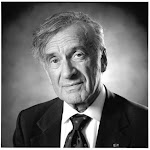Upon arriving at Gleiwitz in the middle of the night, everyone was in a hurry to get themselves inside the barracks. The Kapos lead their assigned inmates to the respective barracks, but the whole process was anything but orderly. Masses of people were attempting to enter the small doors to the barracks at once and the scene quickly turned ugly when people were pushed to the ground and trampled on. Elie and his father were thrown to the floor by the moving crowd, landing on top of others struggling to enter. Underneath Elie was a boy that he recognized the voice of. Juliek, from Warsaw whom he had been with at Buna. Elie was being pushed down on top of Juliek and crushing, but even with his attempts to remove the weight from his back, Elie was stuck for the time without any way out.
Next, someone was pushed down on top of Elie and he could not breathe, either through his mouth or his nose. The thought of a slow, silent death by suffocation was dreadful. He had to do something, but he could neither yell nor call for help. It seemed as if it were to be the end. He did not know if he was struggling with a dead man or a silent foe holding him down, but with all the energy he could muster, he fought his way to the open air with the passion to live coming forth through his nails. At last he prevailed, creating a whole through which he "could drink a little air." These words that he uses illustrate how desperate he was to survive. This shows that his will to fight on and survive was still strong, that he was not yet ready to give up.
Once he was able to regain his breath, Elie called out to his father, who replied with a distant "Yes!" His father had remained conscious too and was now trying to sleep, something that Elie was surprised by and worried about because of the threat of death being so near.
Then from across the barracks came the sound of a violin being played in the dark. It was Juliek, playing a fragment of a Beethoven concerto. Elie listened as if in a trace, saying, "Never before had I heard such a beautiful sound." Juliek was now playing with his entire being, his full passion passing throw the bow into the strings. This moment when the barrack's darkness enveloped Elie, became one that he would remember forever. The song brings back "the pale and melancholy face of [his] polish comrade" every time that he hears it. That night changed him and he was most affected by the cruel happens of the piles of dead built up on top of the living.
The stay at Gleiwitz was short. They only remained there for three days, but for three days without food or water. No one was to leave the barracks, under the consequence of immediate execution by the SS soldiers who stood guarding outside the doors. At dawn on the third day, the entire camp was emptied and driven out towards a gate. The gate divided the camp in two and work quickly spread: selection! The weak were driven to the left, those who could walk to the right. Elie was separated from his father as he was pushed to the left. Elie ran after him, inching his way through the crowd as several guards ran after him. With the shoving, jostling and confusion that the guards created, many people were able to move back over to the right side, amongst them, Elie and his father.
Those who survived the selection process were lead out of the camp and taken on a half-hour march until they came to a railroad crossing in the middle of a field. The wait for the train was strenuous, magnifying the effects of their hunger and fatigue. After a while, they were each given a ration of bread, the usual small ration of crumbs and stale crust. One prisoner, in his desperation to quench his thirst, decided he would eat spoonfuls of snow to satisfy his need. Soon, all the inmates were eating snow off of their neighbors' backs, taking a bite of bread and a mouthful of snow. This seemed to amuse the SS who were watching the occurrence and they began to laugh amongst themselves. This finding of humor in the situation and the guards' indifference towards the inmates' inhumane treatment is a great sign of the evil nature of the German guards. Their ideals and indoctrinations completely disregarded the worth and dignity of their fellow human beings because of their differences.
Finally, after many hours of endless snow, the infinitely long train arrived. The train constructed of many open-topped cattle cars. As the SS shoved the inmates inside, they were loaded with one hundred to a car. Once everyone was loaded, the shipment of humans began to move.
Subscribe to:
Post Comments (Atom)



.jpg)

No comments:
Post a Comment